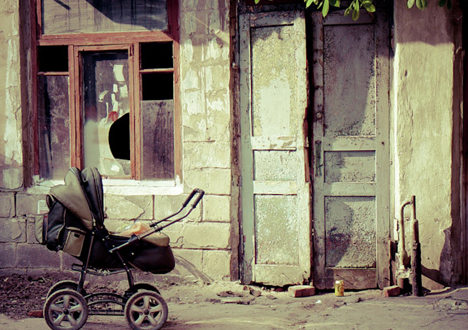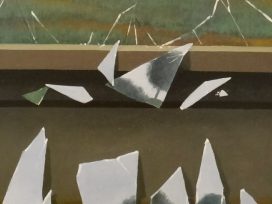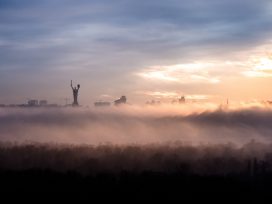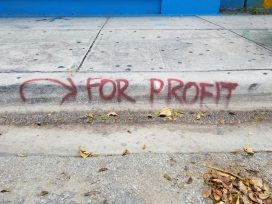After three days of appearing in Houses of Culture, libraries, and military bases, we are headed home, to Kharkiv. But acquaintances of ours from Starobelsk, the co-organizers of the Road to the East-festival, unexpectedly suggest that we join them in taking assistance to a local family with lots of children. We stop by the supermarket and pick up several bags of food: sugar, flour, canned goods. We head to where they live. The road is torn up, like the majority of roads here. After the rain, everything looks particularly bleak. The family has five children. They are a bit spooked, not used to attention. But they adapt quickly, start smiling.
There was no war in Starobelsk. But this family doesn’t need a war to feel abandoned and forgotten in time and space. They have their own special status: they are trying to survive no matter what the politicians say on television. How many families like them are there here? With lots of children, not needed by anyone. Local families, or families who came here from occupied territory. Even before the war they didn’t feel particularly secure, but then the war made their problems second-tier, problems that could wait. In general, war is a good way to absolve yourself of responsibility. Which is what the Ukrainian authorities have been doing for a couple years now.

Photo: Osanova. Source: Flickr
Demagogy, propaganda, populism, cursing the occupiers. Sometimes you get the impression that these occupiers should renovate our schools, roads, bridges, stock our libraries, support our hospitals. You think about this when you talk with the locals. After all, you can’t voice your demands to the authorities – the authorities are far away, they won’t hear you – but here you can complain to the volunteers and activists. And in response the volunteers will try to help in some way. Because the authorities can’t help anyway – they have more serious matters to deal with: they’re busy counting their money.
Meanwhile, the Luhansk region keeps on living its life, having adjusted to the reality that the war goes on, and no one can say when it will end. The soldiers say hello to the locals, and everyone has gotten to know each other long ago; girls go up to the soldiers at their posts, breaking every imaginable regulation, and chat amiably. These soldiers in these small Luhansk towns far from the front look altogether well-groomed (and svelte) – unlike the ones sitting in trenches a few dozen kilometres from here. Everything there is, of course, simpler and more immediate – what most needs to be clean are the weapons.
We are standing in Starobelsk on the square in front of the bus station. In the middle of the square there is an enormous puddle. A jeep with a “Chaplain” license plate drives across it slowly. Some local person comes up to us, points to the puddle and says: “This is the city’s calling card.” No way, we answer him, you’re its calling card. That’s more or less how it is: cities can be rebuilt, roads can be repaired, but you can’t substitute budget allocations for love.
Today there truly are important things happening with the local population (all right, all right, with part of the local population). Besides an attachment to their birthplace, they are beginning to feel a sense of responsibility for that place; they’re trying to do something, at least with those potholes and mud. Activism, ribbons, and flags are evolving into projects, civic initiatives and working with the authorities. That is, the idea is becoming reality, changing that reality at least in some small way.
From a distance you can’t see it, you won’t read about it online, but talking with local librarians, village and town mayors, doctors, and teachers, you understand: something is really changing. Their relationship to the country, their understanding of it, their sense of it is changing. They don’t have all that many opportunities, and so it is of the utmost importance that tomorrow they aren’t deprived of what they still have today. Otherwise what will be the point of all these projects and initiatives, if behind their backs someone yet again gets it in their head to dump territory, to offer someone special status, to barter over leading positions and profit sources. Right now it is important to hang on to these people, not to let them go, not to betray them, when all is said and done.
In the school principal’s office there is a portrait of the president (yes, yes, the Ukrainian president); in the Novopskov regional museum there is a new hall dedicated to the Anti-Terrorist Operations; in Svatove, at the same time as our festival, there was an interregional volleyball tournament. The air is clear and light, and the dark blue valleys are warming in the sun. On the streets you see more and more colourful Chinese coats and tennis shoes. Buses run along the dilapidated road towards the Russian border. Everyone has his own road to the East.








